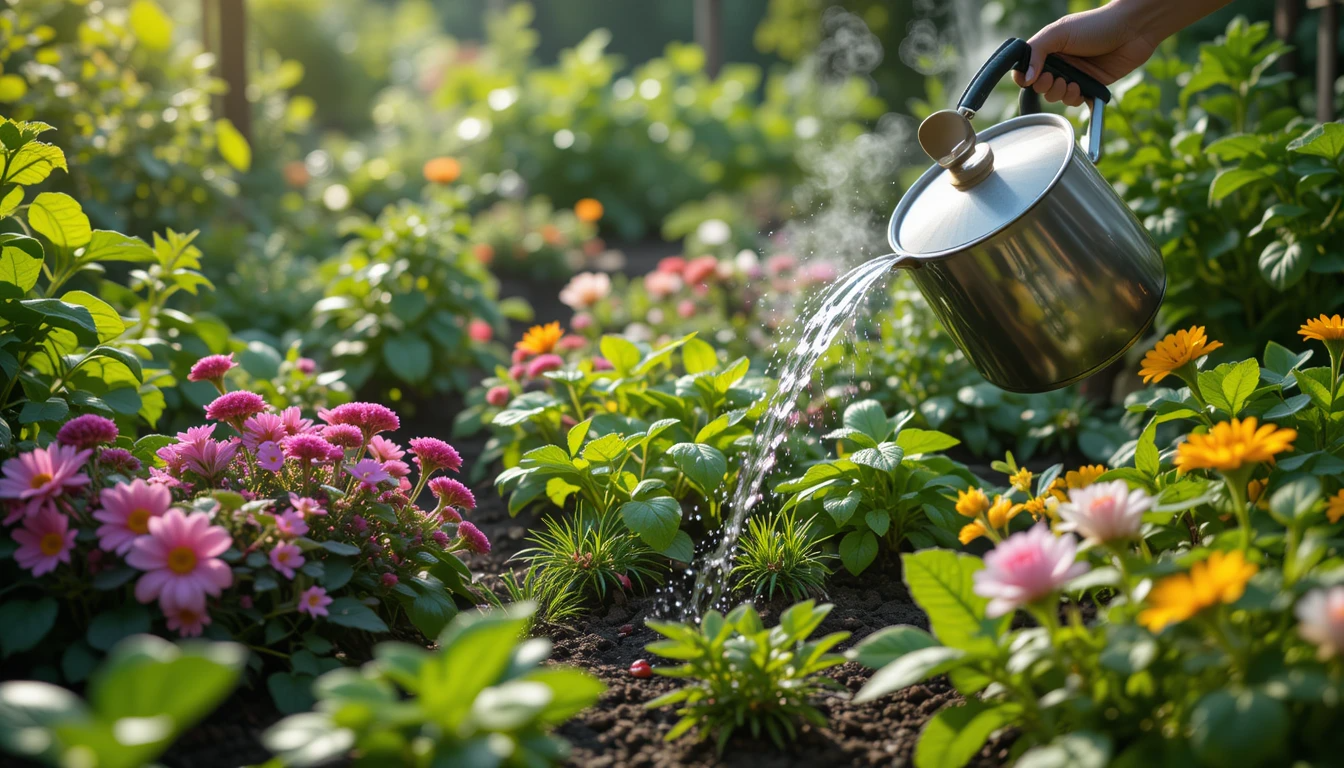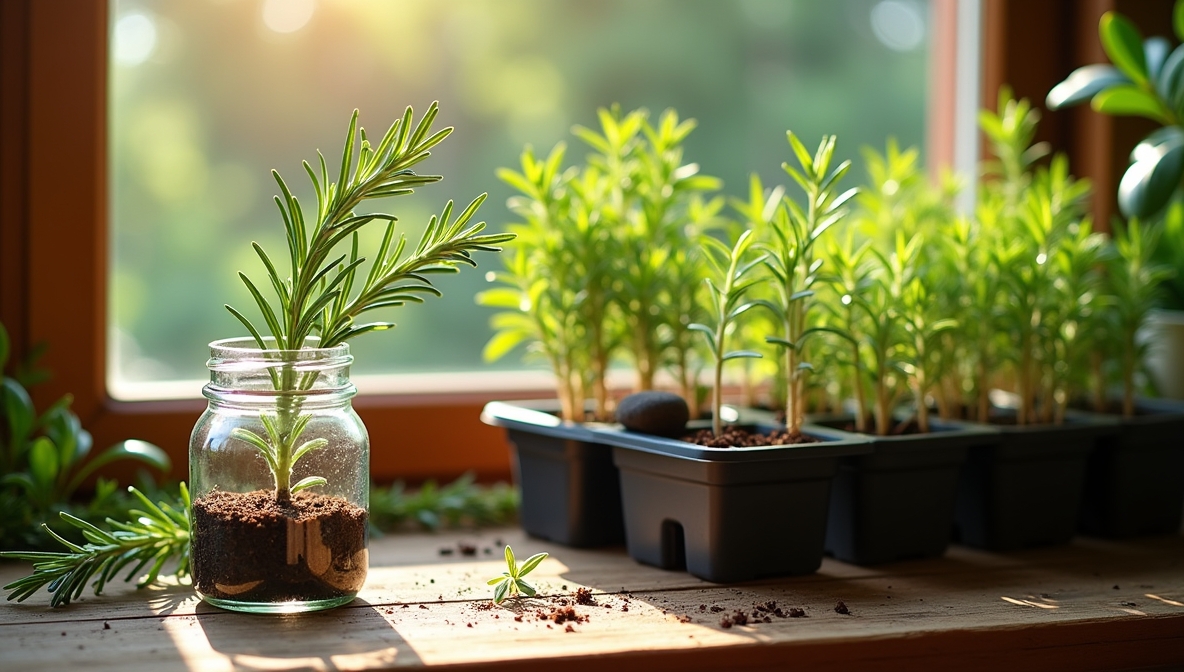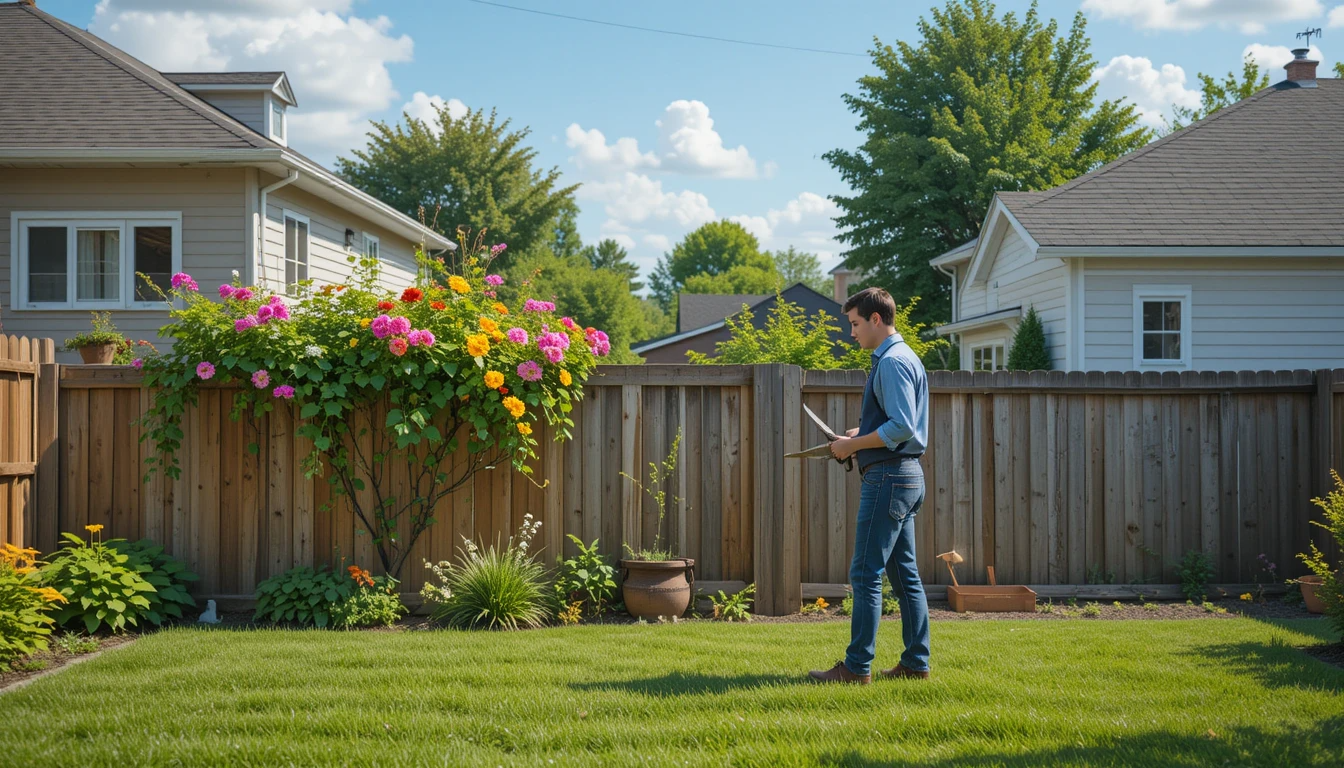Using cooking water in your garden can be a simple yet effective way to boost your plants’ health. Rich in nutrients, cooking water can serve as a natural fertilizer, reducing the need for synthetic products. Reusing cooking water is not only eco-friendly but also cost-effective, making it an attractive option for gardeners looking to minimize their environmental footprint.

Many gardeners are unaware of the potential benefits of using cooking water. By incorporating it into your gardening routine, you can create a more sustainable and thriving garden. Expert gardeners swear by the practice, citing its ability to enhance soil quality and promote healthy plant growth.
Key Takeaways
- Reusing cooking water reduces waste and conserves water.
- Cooking water can act as a natural fertilizer, enriching the soil.
- Incorporating cooking water into your gardening routine can enhance plant health.
- This eco-friendly practice supports sustainable gardening.
- Using cooking water can lead to cost savings on fertilizers and water bills.
The Hidden Garden Gold You’re Pouring Down the Drain
Sustainable gardening starts in the kitchen, where the water you use for cooking can become liquid gold for your plants. Instead of pouring it down the drain, you can repurpose this water to nourish your garden. Using cooking water is a simple yet effective way to reduce kitchen waste and promote eco-friendly gardening practices.
Cooking water contains various nutrients and minerals that can benefit your plants. For instance, pasta water is rich in starch, which can help retain moisture in the soil. Vegetable water is packed with vitamins and minerals that plants love. By utilizing cooking water, you’re not only reducing waste but also creating a more sustainable gardening routine.
| Type of Cooking Water | Nutrients | Benefits |
|---|---|---|
| Pasta Water | Starch | Retains soil moisture |
| Vegetable Water | Vitamins and Minerals | Nourishes plants |
| Rice Water | Starch, Vitamins | Promotes healthy growth |
By adopting this practice, you’re contributing to a more sustainable gardening approach, reducing your environmental footprint, and enhancing plant care. It’s a small change with significant benefits for your garden and the planet.
What Makes Cooking Water a Secret Weapon for Plants?
While many gardeners discard cooking water without a second thought, it actually contains valuable nutrients that can enhance plant growth. This often-overlooked resource is rich in nutrient content, making it a beneficial addition to your gardening routine.
Nutrient Content Analysis
Cooking water is a liquid goldmine for plants due to its nutrient-rich composition. When you boil vegetables, pasta, or rice, some of the nutrients leach into the water. For instance, pasta water contains starch, which acts as a natural fertilizer, while vegetable water is packed with vitamins and minerals. By utilizing cooking water, you’re providing your plants with a boost of these essential nutrients, promoting healthier growth and development.
Comparing Cooking Water to Regular Water
Regular water hydrates plants but lacks the additional nutrients found in cooking water. Using cooking water can be considered one of the effective gardening hacks that gives your plants an extra nutritional kick. The nutrients in cooking water can help improve soil quality and plant health, making it a valuable resource for gardeners looking to enhance their plant care routine.
Incorporating cooking water into your gardening practice is a simple way to recycle nutrients that would otherwise be wasted. By doing so, you’re not only reducing waste but also providing your plants with the cooking water benefits that can lead to more robust and vibrant growth.
Types of Cooking Water and Their Garden Superpowers
Cooking water, often discarded without a second thought, holds surprising potential for gardening. Different types of cooking water offer a range of benefits for plants, from nutrient-rich solutions to starchy boosters for growth.
Pasta Water: Starchy Goodness for Growth
Pasta water is rich in starch, which can help improve soil structure and provide plants with a beneficial carbohydrate source. This starchy water can be particularly useful for plants that thrive in moist environments.
Vegetable Water: Vitamin-Rich Solution
Water used for boiling vegetables is packed with vitamins and minerals that can nourish plants. This nutrient-rich cooking water can be an excellent addition to your gardening routine, promoting healthy plant development.

Rice Water: The Ancient Asian Gardening Secret
Rice water has been used for centuries in Asian gardening practices. It’s rich in nutrients and can help promote healthy root development in plants. Using rice water can be a simple yet effective way to boost your garden’s productivity.
Potato Water: Mineral-Rich Elixir
Potato water is another valuable resource for gardeners. It contains minerals that can benefit plant health, including potassium, which is essential for overall plant well-being. Using potato water can help create a more balanced nutrient profile in your garden soil.
By understanding the unique benefits of different cooking water types, gardeners can make informed decisions about how to use these resources effectively, promoting healthier plant growth and more sustainable gardening practices.
The Science Behind Why Plants Love Cooking Water
The benefits of using cooking water for plants are rooted in its nutritional content and how plants absorb these nutrients. Cooking water contains various vitamins, minerals, and other nutrients that are beneficial for plant growth.
How Plants Absorb These Bonus Nutrients
Plants absorb nutrients from cooking water through their roots. The nutrients are then distributed throughout the plant, promoting healthy growth. Nutrients like potassium and phosphorus are particularly beneficial, as they support root development, flower and fruit production, and overall plant health.

Research-Backed Benefits
Research has shown that using cooking water can have several benefits for plants. These include improved growth rates, increased resistance to disease, and enhanced nutritional content. A study comparing plants watered with cooking water to those watered with regular water found that the former had significantly higher yields.
| Nutrient | Benefit to Plants | Source in Cooking Water |
|---|---|---|
| Potassium | Supports root development and overall health | Vegetable and potato water |
| Phosphorus | Promotes flower and fruit production | Pasta and rice water |
| Micronutrients | Enhances plant resistance to disease | Various vegetable waters |
By understanding the science behind cooking water’s benefits, gardeners can make informed decisions about how to use it effectively in their gardens.
When to Hit Pause: Plants That Don’t Like Cooking Water
While cooking water can be beneficial for many plants, there are certain types that may not appreciate this nutrient-rich liquid. Understanding which plants fall into this category is crucial for maintaining a healthy and thriving garden.

Salt Content Concerns
One of the primary concerns with using cooking water is its salt content. If you’ve been cooking with salted water or adding seasonings, the resulting cooking water can be too salty for some plants. Succulents and plants native to salt-free environments may suffer from salt buildup, leading to root damage or leaf burn.
Oil and Fat Considerations
Cooking water that contains oil or fat can be detrimental to plants. These substances can coat the roots, preventing them from absorbing necessary oxygen and nutrients. This can lead to root rot and other problems, ultimately harming the plant’s overall health.
Acid-Loving Plants and Cooking Water
Some plants, like azaleas and blueberries, thrive in acidic environments. However, cooking water can sometimes be too alkaline, potentially disrupting the soil pH balance these plants require. It’s essential to monitor the pH level of your cooking water and adjust accordingly to avoid harming these sensitive plants.
| Plant Type | Cooking Water Suitability | Reason |
|---|---|---|
| Succulents | No | High salt content |
| Azaleas | Caution | pH imbalance |
| Tomatoes | Yes | Nutrient-rich |
Expert Gardening Tips: Maximizing Cooking Water Benefits
The secret to making cooking water work wonders for your plants lies in applying expert gardening tips. To maximize the cooking water benefits, you need to focus on a few key strategies that preserve nutrients and ensure your plants absorb them effectively.
Cooling Methods That Preserve Nutrients
One crucial step is cooling the cooking water to a temperature that’s safe for your plants. Rapid cooling methods, such as placing the water in a cool water bath or using ice packs, can help preserve the nutrients. This step is essential to prevent shocking your plants’ roots.

Proper Dilution Ratios
Another important aspect is achieving the right dilution ratio. Generally, a 1:1 or 1:2 ratio of cooking water to regular water is recommended, but this can vary depending on the type of cooking water and the plants you’re watering. For instance, starchy pasta water might require a higher dilution ratio than vegetable water.
Application Timing for Maximum Effect
The timing of application also plays a significant role in maximizing the benefits of cooking water. Watering your plants during their active growth phase, typically during the morning or early evening, can enhance nutrient absorption.
By implementing these expert gardening tips, you can significantly improve the health and vitality of your garden, making the most of the nutrients available in cooking water.
Smart Storage Solutions for Your Plant Nutrition
To maximize the benefits of using cooking water in your garden, it’s essential to store it correctly. Proper storage maintains the nutritional value and prevents contamination.
Container Recommendations
Choose containers that are clean, durable, and suitable for food storage. Food-grade plastic buckets or glass jars are excellent options. Ensure they have tight-fitting lids to prevent contamination and keep nutrients inside.
How Long Can You Store It?
Cooking water can typically be stored for up to a week in the refrigerator. For longer storage, consider freezing it in airtight containers or ice cube trays. This method helps preserve nutrients and prevents bacterial growth.
Preventing Bacterial Growth
To prevent bacterial growth, store cooking water in a cool, dark place or refrigerate it. Adding a small amount of apple cider vinegar or lemon juice can also help maintain its quality by creating an acidic environment less favorable to bacteria.

Revolutionary Gardening: Creating a Kitchen-to-Garden System
A kitchen-to-garden system is a revolutionary approach to sustainable gardening that utilizes cooking water and other kitchen waste. This method not only reduces waste but also provides a nutrient-rich supplement for your plants.
Setting Up a Collection Routine
To start, you’ll need to establish a routine for collecting cooking water and other kitchen waste. This can be as simple as keeping a large container near your sink to store the water. Labeling the container can help ensure it’s used correctly.
Combining with Other Natural Fertilizers
Cooking water can be combined with other natural fertilizers like compost or manure to create a potent garden supplement. Mixing these elements can enhance their effectiveness and provide a balanced nutrient profile for your plants.
Seasonal Adjustments to Your System
As the seasons change, your kitchen-to-garden system may need adjustments. For example, during the growing season, you may need to increase the frequency of application, while in the dormant season, you might reduce it. Monitoring your plants’ response to the system will help you make the necessary adjustments.
Success Stories: Gardens Transformed by Cooking Water
Cooking water, once considered waste, is now being hailed as a miracle worker in gardens nationwide. The use of cooking water has led to remarkable transformations in various gardens, showcasing its potential as a valuable resource.
Before and After Results
Gardeners have reported significant improvements in plant health and growth after incorporating cooking water into their gardening routine. For instance, a community garden in California saw a 50% increase in vegetable yield after using pasta water rich in starch.
Community Garden Experiments
Community gardens have been at the forefront of experimenting with cooking water. One such garden in New York conducted an experiment using rice water, resulting in healthier and more vibrant plants. The gardeners attributed this success to the nutrient-rich properties of the rice water.
Expert Gardener Testimonials
Experts in the field have shared their positive experiences with using cooking water. “I’ve seen a significant difference in my plants’ growth since I started using cooking water,” says Jane Doe, a renowned gardener. “It’s a simple yet effective way to give your plants the nutrients they need.”
- Increased plant growth and health
- Improved soil quality
- Reduced waste through repurposing cooking water
Troubleshooting: When Your Cooking Water Plan Goes Wrong
While cooking water can be a boon for your garden, it’s not without its potential pitfalls. Even with careful planning, issues like plant yellowing, soil buildup, and pest attraction can arise, requiring prompt attention to prevent long-term damage.
Addressing Plant Yellowing
If your plants start to yellow after using cooking water, it might be a sign of over-fertilization. Check if you’re using too much cooking water or if it’s too rich in nutrients. Diluting the cooking water with regular water can help mitigate this issue.
Soil Buildup Problems
Soil buildup can occur if the cooking water is high in starch or other substances that don’t break down quickly. To address this, flush your soil with regular water to remove excess buildup. You can also mix in some organic matter like compost to help balance the soil’s composition.
Pest Attraction Concerns
Cooking water, especially if it’s from starchy foods, can attract pests. To minimize this risk, avoid leaving cooking water out in the open and use it promptly. If you notice pests, consider using natural pest control methods to keep them under control.
Beyond Cooking Water: Complete Kitchen Waste Gardening Guide
Beyond cooking water, your kitchen holds a treasure trove of gardening opportunities. By leveraging various kitchen wastes, you can create a more sustainable and thriving garden ecosystem.
Coffee Grounds and Eggshells
Coffee grounds are rich in nitrogen, making them an excellent addition to compost or a direct soil amendment. Eggshells provide calcium and deter pests like slugs. Crushing eggshells before adding them to the soil can enhance their effectiveness.
Composting Basics for Beginners
Composting is a fundamental aspect of kitchen waste gardening. It involves breaking down organic materials into a nutrient-rich soil amendment. Beginners can start with a simple compost bin, adding a mix of ‘green’ materials (like kitchen scraps) and ‘brown’ materials (such as dried leaves).
Creating a Zero-Waste Garden Cycle
A zero-waste garden cycle involves maximizing the use of all kitchen waste. This can be achieved by composting, using kitchen waste as mulch, or directly incorporating certain wastes into the soil. By adopting this approach, gardeners can reduce their waste output while creating a more resilient garden ecosystem.
Transform Your Gardening Results with Kitchen Wisdom
By now, it’s clear that incorporating cooking water into your gardening routine can have a significant impact on your gardening results. This simple, yet effective technique is a prime example of kitchen wisdom in action, allowing you to reduce waste while nourishing your plants.
Sustainable gardening practices like using cooking water can lead to healthier plants, reduced water consumption, and a more environmentally friendly gardening approach. By adopting these methods, you’re not only improving your garden’s health but also contributing to a more sustainable future.
As you’ve learned, different types of cooking water offer unique benefits, from the starchy goodness of pasta water to the vitamin-rich properties of vegetable water. By understanding how to harness these benefits and combining them with other kitchen waste, such as coffee grounds and eggshells, you can create a comprehensive and sustainable gardening system.
By embracing kitchen wisdom and incorporating these simple, eco-friendly practices into your daily gardening routine, you’ll be well on your way to achieving remarkable gardening results and enjoying a lush, thriving garden.
FAQ
What types of cooking water are best for plants?
Vegetable water, pasta water, and rice water are excellent options, as they contain nutrients that promote healthy plant growth.
Can I use cooking water on all my plants?
No, some plants like cacti and acid-loving plants may not benefit from cooking water. It’s essential to research the specific needs of your plants.
How often should I use cooking water on my plants?
It’s recommended to use cooking water once a week, diluted with regular water to avoid over-fertilizing.
How do I store cooking water for gardening?
Store cooking water in a clean, covered container in the refrigerator to prevent bacterial growth and contamination.
Can I mix cooking water with other fertilizers?
Yes, cooking water can be combined with other natural fertilizers like compost tea or fish emulsion to create a nutrient-rich solution.
What are the signs that my plants are benefiting from cooking water?
Look for signs like lush foliage, vibrant colors, and increased growth rate, which indicate that your plants are responding well to cooking water.
Can cooking water attract pests to my garden?
Yes, if not used properly, cooking water can attract pests. Make sure to dilute it and avoid using it on plants that are prone to pest issues.
How long can I store cooking water?
It’s best to use cooking water within a few days of storage. If you won’t be using it within that timeframe, consider freezing it for later use.
Can I use cooking water that’s high in salt or oil?
No, it’s not recommended to use cooking water that’s high in salt or oil, as it can harm your plants and contaminate the soil.




